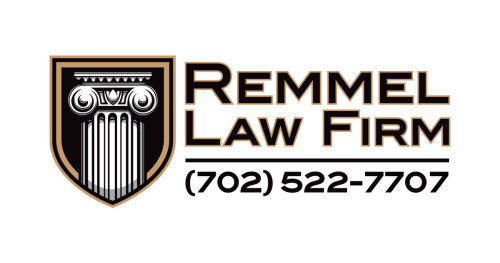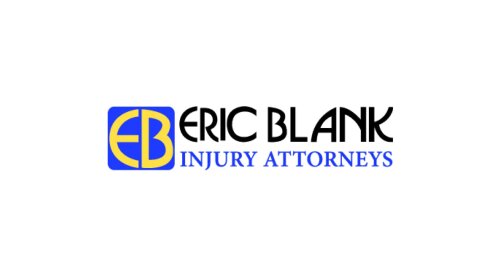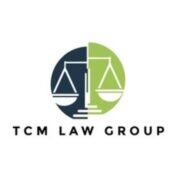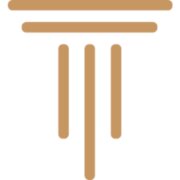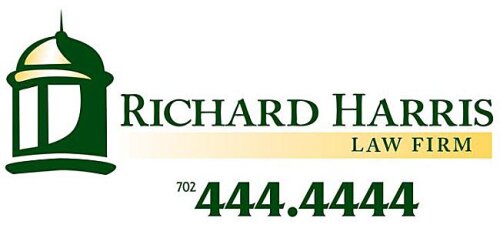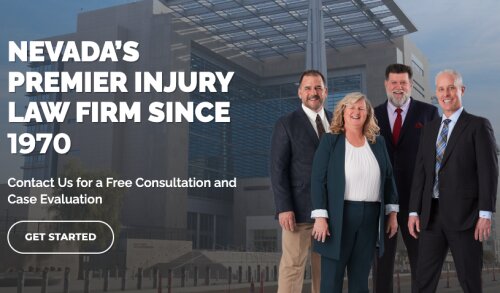Best General Litigation Lawyers in Las Vegas
Share your needs with us, get contacted by law firms.
Free. Takes 2 min.
List of the best lawyers in Las Vegas, United States
About General Litigation Law in Las Vegas, United States
General litigation covers civil disputes that are resolved through the court system rather than through administrative agencies or informal negotiation. In Las Vegas, most civil litigation is handled in Nevada state courts - primarily the Eighth Judicial District Court in Clark County for higher-value and complex matters - and in municipal and justice courts for smaller claims. General litigation includes cases such as contract disputes, business and commercial litigation, real estate disputes, landlord-tenant matters, debt collection, personal injury, consumer protection claims, employment disputes, probate litigation and declaratory-judgment actions. The process typically moves from pleadings and pretrial discovery into motions practice and, if the case does not settle, trial. Alternative dispute resolution - especially mediation and arbitration - is commonly used to avoid the time and expense of a jury or bench trial.
Why You May Need a Lawyer
Hiring a lawyer can make a substantial difference in the outcome of a civil dispute. A lawyer can help you evaluate the strengths and weaknesses of your claim or defense, calculate damages, prepare written pleadings, gather and preserve evidence, comply with court rules and deadlines, handle discovery tools such as depositions and document requests, file or oppose dispositive motions, and present your case at trial. You may want a lawyer in situations such as when the legal issues are complex, the potential damages are substantial, you face a skilled opposing party, the matter requires immediate court action to protect rights, or you need help enforcing or collecting a judgment. Even in smaller cases, a lawyer can advise you about settlement strategy and fee arrangements - for example, contingency-fee representation is common in personal-injury claims while hourly or flat fees are common in contract and transactional disputes.
Local Laws Overview
Nevada litigation follows state statutes and court rules, with local practice requirements in Clark County. Key aspects to understand include court structure, procedural rules, local rules, filing and e-filing requirements, deadlines, and discovery procedures.
Court structure - The Eighth Judicial District Court - sitting in Clark County - is the primary trial court for major civil cases in Las Vegas. Municipal courts and justice courts handle limited civil matters and small claims. Appeals go to the Nevada Court of Appeals and the Nevada Supreme Court depending on the type of case and procedural posture.
Procedural rules - Nevada has its own Rules of Civil Procedure that generally track the Federal Rules of Civil Procedure but include state-specific provisions. These rules govern pleadings, service, motions, discovery, pretrial conferences, and trial practice. Local rules for the Eighth Judicial District and for justice and municipal courts set additional requirements on formatting, filing, calendars and courtroom procedures.
E-filing - Many Nevada courts require electronic filing for attorneys and have portals for self-represented litigants to file court papers. Local clerks publish instructions and technical requirements for electronic submissions.
Discovery - Parties may use written discovery - interrogatories, requests for production and requests for admission - as well as depositions and subpoenas. Nevada has timing rules and limits designed to promote fair discovery while preventing undue delay or abuse. Motion practice - Motions to dismiss, motions for summary judgment and other procedural motions are common. Courts have specific briefing and page-limit rules and strict filing deadlines.
Statutes of limitations and jurisdictional limits - Time limits to file suit differ by claim type and are governed by Nevada statute. Monetary jurisdictional limits vary by court - for example, small-claims and justice courts have caps on the amount in controversy, while district courts hear larger cases. Appeal timelines and standards are strictly enforced, so missing a deadline can waive appellate rights.
Alternative dispute resolution - Clark County courts and the Nevada Rules encourage or require ADR in many cases. Parties frequently use court-ordered or private mediation and arbitration clauses are commonly enforced if they are validly drafted.
Frequently Asked Questions
What should I do first after a dispute arises?
Preserve evidence - save emails, contracts, receipts, photographs and any other records related to the dispute. Note key dates and witness contact information. If the matter involves imminent court deadlines or potential loss of rights, consult an attorney quickly to learn whether immediate action - such as seeking a temporary restraining order or filing a suit before a statute of limitations expires - is required.
How long will my case take?
Timelines vary widely based on case complexity, court backlog, willingness to settle and whether discovery or expert testimony is necessary. Some matters settle in weeks or months; others take a year or more to reach trial. ADR can shorten the timeline. Your lawyer can give a tailored estimate after reviewing facts and procedural posture.
How much will hiring a lawyer cost?
Cost depends on the type of case and fee arrangement. Common arrangements include contingency fees - often used in personal-injury cases where the lawyer is paid a percentage of recovery - hourly billing, flat fees for limited services and retainers to secure ongoing work. Expect additional expenses for filing fees, court reporter and deposition costs, expert witnesses and document production. Ask potential lawyers for a clear fee agreement and an estimate of total costs.
Can I represent myself?
Yes - litigants may represent themselves, but self-representation carries risks. Courts apply the same rules against self-represented parties as they do against lawyers. Complex procedural requirements, discovery obligations and legal standards can put a layperson at a disadvantage. Consider consulting an attorney for advice or limited-scope services if full representation is not feasible.
What is discovery and why is it important?
Discovery is the pretrial process for exchanging evidence and information between parties. It includes interrogatories, requests for production, requests for admission and depositions. Discovery helps each side evaluate the strength of claims and defenses, narrow issues, preserve testimony and prepare for motions or trial. Failure to comply with discovery obligations can result in sanctions or adverse rulings.
How do settlement negotiations typically work?
Settlement discussions may happen informally between counsel, through mediation or during court-ordered settlement conferences. Parties exchange settlement offers and may negotiate terms including payment, releases, confidentiality, and non-monetary remedies. A written settlement agreement finalizes the terms. Your attorney will evaluate offers against the likely trial outcome and costs to advise whether to accept or continue litigation.
What if the other party files a motion to dismiss?
A motion to dismiss challenges the legal sufficiency of the complaint. If granted, the court may dismiss some or all claims, sometimes with leave to amend. If denied, the case proceeds to discovery. Responding effectively requires legal analysis of the complaint, applicable statutes and case law, so consult counsel promptly to draft a response and preserve arguments.
How are damages calculated in civil cases?
Damages depend on the claim. Compensatory damages reimburse losses such as medical bills, lost wages and property damage. In contract cases, damages may include expectation or consequential damages. Punitive damages are intended to punish particularly wrongful conduct and are awarded more rarely. Expert testimony is often required to establish the amount of economic damages and to quantify future losses.
What happens after I win a judgment?
A judgment is the court's official decision. Winning does not guarantee collection. Judgment creditors may need to take enforcement steps - such as wage garnishment, bank levies or liens - to collect. Debtor exemptions and bankruptcy can affect collection. A lawyer can advise on the most effective collection methods and any costs involved.
How do appeals work in Nevada?
Appeals challenge legal errors made by the trial court. Only final judgments are typically appealable, though some interlocutory orders can be reviewed by appeal or petition in limited circumstances. Appellate practice is governed by strict procedural rules and deadlines for filing notices and briefs. Appellate courts review the trial record and legal arguments and generally defer to factual findings unless clearly erroneous. Consult an appellate attorney quickly after entry of judgment if you are considering an appeal.
Additional Resources
State Bar of Nevada - for lawyer referrals, ethics information and resources on hiring a lawyer. Clark County Bar Association - local networking and attorney referral resources. Eighth Judicial District Court - publishes local rules, filing information and calendars for Las Vegas trials. Nevada Judiciary self-help centers - provide forms and procedural guidance for self-represented litigants. Nevada Legal Services and Legal Aid Center of Southern Nevada - for low-income individuals seeking civil legal assistance. Administrative Office of the Courts - for statewide court policies and electronic filing guidance. Nevada Legislature - to review current statutes that affect civil claims and limitations. Local law libraries - for statutes, case law and practice guides available to the public.
Next Steps
If you need legal assistance in a Las Vegas civil matter, start by organizing your documents and creating a concise timeline of events. Identify key witnesses and preserve evidence. Contact the State Bar of Nevada or a local bar association for a referral to an attorney who handles your type of case. When you meet with a lawyer, bring relevant documents, be prepared to describe the facts succinctly and ask about likely costs, expected timeline and possible outcomes. If you cannot afford full representation, explore low-fee or pro bono programs, limited-scope representation and self-help resources from the courts.
This guide is informational only and does not constitute legal advice. Laws and court procedures change - consult a licensed Nevada attorney for advice tailored to your situation.
Lawzana helps you find the best lawyers and law firms in Las Vegas through a curated and pre-screened list of qualified legal professionals. Our platform offers rankings and detailed profiles of attorneys and law firms, allowing you to compare based on practice areas, including General Litigation, experience, and client feedback.
Each profile includes a description of the firm's areas of practice, client reviews, team members and partners, year of establishment, spoken languages, office locations, contact information, social media presence, and any published articles or resources. Most firms on our platform speak English and are experienced in both local and international legal matters.
Get a quote from top-rated law firms in Las Vegas, United States — quickly, securely, and without unnecessary hassle.
Disclaimer:
The information provided on this page is for general informational purposes only and does not constitute legal advice. While we strive to ensure the accuracy and relevance of the content, legal information may change over time, and interpretations of the law can vary. You should always consult with a qualified legal professional for advice specific to your situation.
We disclaim all liability for actions taken or not taken based on the content of this page. If you believe any information is incorrect or outdated, please contact us, and we will review and update it where appropriate.



